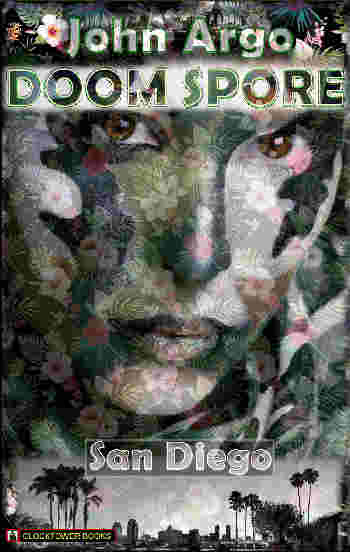Chapter 9
16.
 Lee Collwood, shaken and enraged at the news about his ship, had his private jet make a 15 minute hop from the Salton Sea to Lindbergh Field in San Diego. A long black limousine met him on the tarmac. The driver, a Filipino man in a black suit, got out to open the rear door so he could enter the private luxury of a backseat office with wet bar and satellite uplink for the communications center. In minutes they were speeding south toward National City. En route, his operator back near Brawley finally was able to patch him through to Henry Morton. Lee Collwood, shaken and enraged at the news about his ship, had his private jet make a 15 minute hop from the Salton Sea to Lindbergh Field in San Diego. A long black limousine met him on the tarmac. The driver, a Filipino man in a black suit, got out to open the rear door so he could enter the private luxury of a backseat office with wet bar and satellite uplink for the communications center. In minutes they were speeding south toward National City. En route, his operator back near Brawley finally was able to patch him through to Henry Morton.
Collwood shouted into his phone. "What the hell do you mean, the ship docked and now it's sitting there empty?"
"That's right," said his patient manager of San Diego operations, a six figure a year CEO with 5,000 people working for him. "Don't shoot me. I'm just the messenger."
"Aw for God's sake…" Collwood flipped the phone shut and thrust it into his inside suit pocket. Raising his sunglasses so they rested against his forehead, he frowned at the passing city streets, the buildings, the pedestrians, palm trees framed in sunlight and clear blue skies. The limousine crawled through the shady streets downtown—Broadway, Ninth Avenue, Island Avenue, lined with jacaranda and queen palms—until they arrived in the industrial district around 32nd Street. The limo had stickers to get past Navy and Marine Corps gate guards, and briefly crawled along Government shipyard property before taking a number of narrow dirt alleys among small parcels of heavily fenced private property, and arriving before the northern fringes of NASSCO shipbuilding yards. There sat the Lima Voyager, a 35,000 ton freighter that looked like a toy in a bath tub. She was 250 feet long and broad in the beam, towering four stories above the cracked and mossy pre-World War II dock.
Accompanied by assistants and body guards who kept out of sound range, Lee Collwood strode across the dock and shook Henry Morton's hand. Both men were tall and lean, with the look of those accustomed to giving orders and getting things successfully done. "I'll show you what we have," Morton said as he pushed open the tall, narrow gate of a shiny new inner fence that enclosed the aluminum ramp leading to the ship's main deck. "The Harbor Police were here yesterday, as I mentioned."
"Did they find anything?" Collwood asked. Morton did not know the exact nature of the cargo that was now evidently missing along with the crew and captain. Morton only knew it was a sensitive pharmacological source cargo from somewhere in the South American jungle, and that seemed to be enough for him to understand a successful new line of drugs could rejuvenate Anaconda.
"Their notes are still being reviewed," Morton said as he followed Collwood up the ladder. "I should have a preliminary on my desk by tomorrow, and of course you'll get a copy."
"What about our friend?"
"Miss Hazleton," Morton said with a slight chuckle. He was having an affair with an executive assistant, 24 year old Dolly Hazleton, at the Unified Port District Authority. "She already looked at the notes made by a Linsey Simon, who was the principal investigator."
"And?"
"Basically, nada." Morton shrugged. "Dolly tells me Simon is a shrewd investigator and may be having some second thoughts about this situation."
"Can we move the ship to another port? Sink it?"
"Not right away. It's tied up in red tape here at the dock and has to stay here. In case you didn't notice, we are surrounded by military facilities, and probably a thousand Federal police of various kinds."
Collwood swore as he stepped onto the dusty steel deck. He clapped his hands and looked around as Morton joined him. "Looks deserted."
Morton nodded as he too clapped his hands. "Eerie, isn't it?"
Standing in silence, the two men listened to the creak of a loose door, the slap of stagnant water in bilges, the whistle of wind across an open window.
"I turned off the lights and the mariachi music," Morton said.
"What?"
"They left it looking like the crew's on board."
"Drugs," Collwood fumed. "It's the only explanation. They must have been a bad bunch, from the captain on down. Probably smuggled in a ton of cocaine and had a few samples."
Morton said: "Good scheme, now that you mention it. But the Coast Guard went over the ship with a fine toothed comb."
"And?"
"Our spy there says the dogs were skittish, but they didn't find a trace of illegal drugs in the air. That would tend to run against your theory."
"Unless they were towing it underwater. All that stuff happens. Come on, let's look around below."
Together the men searched the bridge and the First Mate's quarters for flashlights. Then, armed with crowbars and strong lamps, they toured the ship. The galley had a stale, greasy smell. The refrigerator smelled of rotting meat—a large package of hamburger meat had thawed, and blackened blood had leaked over the steel shelves and dripped down to the lowest white enamel surface. Cockroaches scuttled in a swirling mass like brown liquid as Morton quickly slammed the door shut. A tour of the crew quarters revealed open doors, unmade beds, missing suitcases, a forgotten shoe here and an open book there. Nada.
"Catch that smell?" Morton said. "We opened the windows topside to air the place out."
"What is it?" Collwood sniffed. His heart pounded as he recognized the faint, earthy smell of strong fungus. He knew what it was. He had seen pictures of the Peruvian caldera island and its mysterious city. Morton had no idea. Nobody did—only the captain and first mate of this blasted tramp.
So where the hell is my fungus? he fumed inwardly. Grimly, he thought: This is a mess, and I'm going to have to fix it myself. When I track down those bums…
"Someone said it smelled like mushrooms," Morton said, laughing at such a silly idea.
"Like with a huge steak," Collwood joked to cover his own anxiety. If the infestation had escaped, then he knew a disaster was about to happen that would make his troubles at Anaconda look like child's play. He also understood the Feds were smart enough to trace the epicenter to this ship. Suicide was not an option—-he knew he'd be too scared to put his 9mm automatic in his mouth and pull the trigger. But he could take the weapon, in whose use he had trained himself well, and find the scurvy crew of the Lima Voyager and fix their wagons. At the same time, it might be a good idea, just in case, to secretly start planning for his escape to some faraway country, maybe in the tropics, without an extradition treaty with the U.S.
He must get a manifest of the ship's crew and their addresses. He'd start with the captain. But first, he must humor Morton—the man's blindsided investigation might lead him to the captain. They climbed down a narrow passage below decks. The mushroom smell was stronger here, but mixed with a dozen other odors—machine oil, cleaning fluids, a man's cheap cologne. Hearing a buzzing sound, they stopped. "What's that?" Morton said. They took a few steps further. They stopped again. The buzzing was louder. Twin flashlight beams played back and forth on the dusty, cobwebbed steel ceilings and down to the gray deck. "There," Collwood said. "Something spilled."
"Smells like maple syrup."
"Probably is." Their beams focused together and revealed thousands of skittering insects and a large rat. The rat lay dead on its side, and a stream of roaches issued from a hole eaten into its fur. Its black eyes still gleamed, although looking filmy, as light shone on them. It was a miniature La Brea Tar Pits, caused by a five gallon jug of pancake syrup having been tossed from its shelf. The plastic had cracked, causing this inch-deep lake. It indicated the ship had a faint list to one side.
"Look here," Morton said. He pushed open a small door and stepped over a high threshold into a small office. "The Harbor Police investigator mentioned this in her report." He played his beam along a strange object stuck to the baseboard. It was about six feet long, composed of wavy little shelves. It was dark in color, with faint powdery-white edges.
"I'll be darned," Collwood said, looking at a huge bracket mushroom of the kind found in rainforests. They grew along the bottom surfaces of fallen logs near the damp, spongy forest floor.
"What is it?"
Collwood guessed the fungus was a relative of what he had surreptitiously had his men smuggle out of the Peruvian cordillera. "These boys really did sail through some tropical wonderlands," he mused out loud, not caring what Morton thought. It was too late for that now. The Offensor fungus had morphed somehow, and was taking on a life of its own that nobody could have guessed at. After all, it had been kept in check for eons. Now, for the first time, it was free to take on the world. Funny, Lee thought, that's what I'm doing, and now perhaps I have a worthy opponent—some damned mushroom that's a serial killer.



|
  Thank you for reading. If you love it, tell your friends. Please post a favorable review at Amazon, Good Reads, and other online resources. If you want to thank the author, you may also buy a copy for the low price of a cup of coffee. It's called Read-a-Latte: similar (or lower) price as a latte at your favorite coffeeshop, but the book lasts forever while the beverage is quickly gone. Thank you (JTC). Thank you for reading. If you love it, tell your friends. Please post a favorable review at Amazon, Good Reads, and other online resources. If you want to thank the author, you may also buy a copy for the low price of a cup of coffee. It's called Read-a-Latte: similar (or lower) price as a latte at your favorite coffeeshop, but the book lasts forever while the beverage is quickly gone. Thank you (JTC).
|
TOP
|
MAIN
Copyright © 2014 by Jean-Thomas Cullen, Clocktower Books. All Rights Reserved.
|